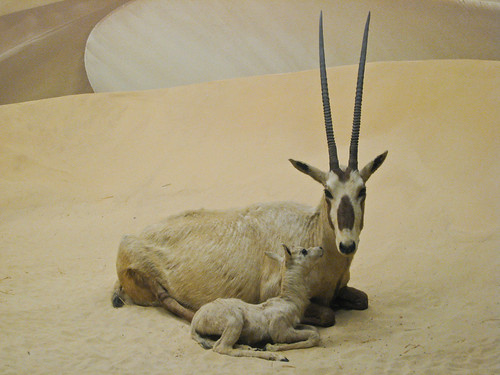
Surprisingly, or perhaps not, given the hot climate they live in, Arabian Oryx will not win any speed competitions, as they are poor runners, however they have excellent endurance when it comes to walking and have been know to walk over 70 km in one night!
If you are ever fortunate enough to see an Arabian Oryx in person, look closely, at 100m they are almost invisible to the human eye since their hair lacks glare and reflection. Source: The Arabian Oryx Project
Why the Arabian Oryx Needs Our Help The Arabian Oryx' is one of the rarest animals in the world with less than 900 individuals in total. It is a highly endangered species found in Bahrain, Israel, Oman and Saudi Arabia. All of the Arabian Oryx have been reintroduced in each of these countries, as they were previously extinct in the wild and only existed in captivity. In the past, the main threat to the Arabian Oryx was being over hunted for both meat and hides, as well as being hunted for recreation by motorized groups. Illegal poaching of re-introduced oryx's is a constant threat today.
The Oman population faces special problems. Arabian Oryx's are caught illegally for sale to private collections, which is the main threat in Oman. As soon as the animals wander outside the protected areas where they have been released, their safety cannot be guaranteed.
Further compounding the problem is the limited choice of future release sites due to drought and overgrazing. Source: Animal Info: Endangered Animals
How You Can Help Save the Arabian Oryx
- Visit the Arabian Oryx Sanctuary in Oman which was also the region's first UNESCO World Natural Heritage Site and the first one to be deleted Source: UNESCO
- Sign up to receive updates from the World Wildlife Fund
- Unfortunately I couldn't find a lot of information on further actions you could take to directly save the Arabian Oryx. If anyone has any, I would love to hear from you to expand this list.
Arabian Oryx photo courtesy of: clairity






